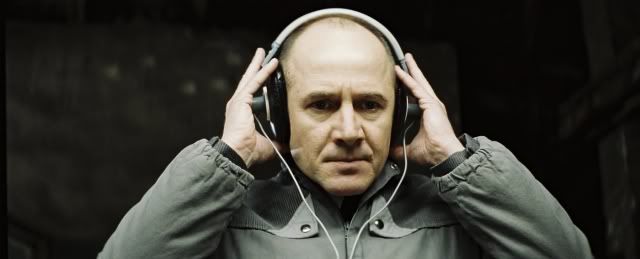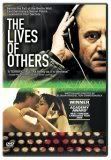
July 26, 2010
Das Leben Der Anderen "The Lives of Others" (2006)
Should I see it?
Absolutely.
Short Review: The only mistakes the Germans make are the big ones.
Communism left a wake of nearly 100,000,000 people killed and we still have slack-jawed losers mincing around campuses with Che Guevara t-shirts claiming "real communism hasn't been tried yet". The communist ideal is inhuman – it rubs against the grain of human nature and simply does not work. It always has and always will lead to a heavy handed government brutally shoving its citizens into lockstep whenever it is tried. This film is one of the most frank attacks on this system.
Writer/Director Florian Henckel von Donnersmarck provides an enthralling film about a lonely Stasti interrogator who gets wrapped up in the lives of a playwright and his actress girlfriend when he begins to spy on them for the government. The story is as engaging and thoughtful as any I have seen. I know of no one who has watched this film and hasn't been touched by the tormented lives of the characters. Looking beyond the politics of the film, this is simply a masterful character piece and that is where the film draws much of its power. With careful guidance by von Donnersmarck the characters slowly smother under the the heavy hand of their government. They each yearn to speak and think freely just as human beings were meant to live.
As much as I adored von Donnersmarck’s direction and script, the film really belongs to the actors. Ulrich Mühe who portrays Hauptmann Gerd Wiesler, the dyed in the wool Stasti officer, provides a masterful performance. He is at once a meek, confused man, conversely, he is also a powerful and cruel agent for the state. As the story progresses and his defenses begin to crumble, Mühe manages to expose the psychological distress of this man while not having much dialog. The fact that he doesn't speak much throughout the film makes Mühe’s performance more striking. To be able to draw the audience in, to be able to give such an emotional performance even though your character doesn't speak and essentially is an observer to the world around him is a remarkable feat.

Mühe’s work would have been for nothing without a strong supporting cast. Sebastian Koch and Martina Gedeck play the investigated playwright and his actress girlfriend. They are the subject’s of Wiesler’s occupation and obsession. They are tasked with fleshing out the narrative and visually carrying much of the film. While Wiesler is the center of the piece, the relationship between these two lovers is what energizes the entire film. Both actors offer a worthy counter weight to Mühe’s landmark performance.
The piece taken as a whole is clearly one of the best films of the 2000's. It is shocking that Hollywood ignored this film. Yes, it won Best Foreign Language at the Oscars – but no Best Actor, Best Director? Best Picture – this powerful movie is a thousand times better than The Departed which received all the attention in 2007. No Golden Globes. This film won no other American awards of note. Quite honestly, it is flabbergasting that this piece isn’t held in higher esteem. Regardless of Hollywood’s natural inclination to support criminal regimes – in particular communist ones – the sheer cinematic power of this film should have cut through all of that nonsense.
The next time you have some half-brained dimwit wetting their pants over how “oppressed” they feel, show them this film. Yes, there has been real oppression in the world and yes, there still is. Much of these political horror stories have come from movements of the left. Communism and its cousin socialism have destroyed more lives than any other human fantasy. This film not only indicts these political thoughts but also indicts those who still defend them.
Related Reviews:
German's Oppressing One Another
Der Untergang "Downfall" (2004)
Der Tunnel (2001)
Other Critic's Reviews:
FilmCritic.com
The Phantom Tollbooth
Click here to buy your copy of
You Are What You See:
Watching Movies Through a Christian Lens
Labels: film, Florian Henckel von Donnersmarck, foreign film, Martina Gedeck, movie review, Ulrich Mühe
Share
Previous Posts




Good News Film Reviews LLC 2004-2010 - used with permission
Images, video and titles are the property of their respective copyright holders. Good News Film Reviews LLC claims no ownership or connection to them.
The views expressed on this site are not the opinion of any advertiser or external entity.
While we take care to only link to responsible entities, Good News Film Reviews LLC takes no responsibility for the content linked from this site. There are sharks in the waters. Surf at your own risk.
The Template is generated via PsycHo and is Licensed.






















0 Comments:
Post a Comment
<< Home